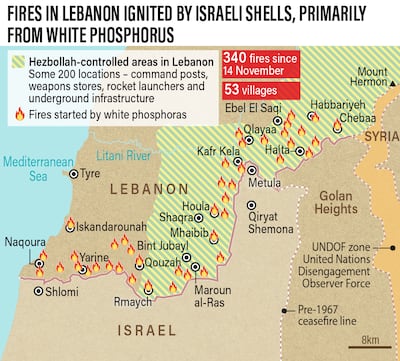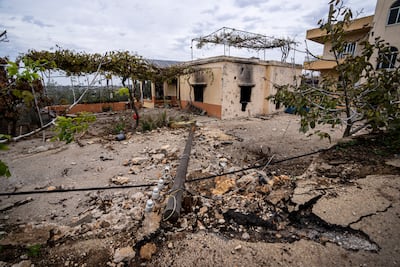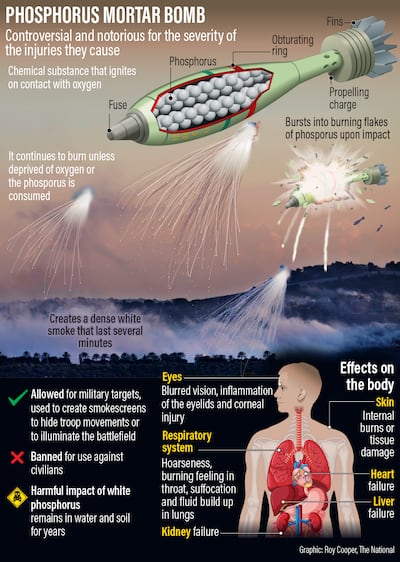Live updates: Follow the latest news on Israel-Gaza
In south Lebanon, farmers have returned to their villages amid the unofficial truce on the Lebanese border only to discover their crops contaminated with white phosphorus and dangerous unexploded shells on their land.
Human rights groups have called for an international investigation into Israel's use of white phosphorus, a highly toxic and flammable substance, during its cross-border clashes with Hezbollah and other allies of Hamas since October 7.
In Dhayra, a hundred metres from the border, Oday Abousari, 29, said that he lost his entire crop after his village was attacked by Israel on October 16.
“The impact is obvious – the lettuce, the cauliflower, the cabbage, it's all going to waste. I can't sell poison,” he told The National, plucking leaves from a crumbling lettuce and pointing to cabbages with yellowish leaves.
In a region heavily dependent on agriculture, and amid Lebanon's economic crisis, the impact on farmers could be devastating.
Many farmers are only now discovering the extent of the damage, having been forced to flee the border region following the outbreak of fighting.
At least 107 people, among them 15 civilians, have been killed in cross-border shelling between Hezbollah and Israel.

Although Hezbollah was not included in the four-day truce agreed to between Hamas and Israel that began on Friday, the pause in fighting has been broadly followed on the Lebanese front, despite reports of sporadic shelling and an attack on a UN patrol in the area.
The lull in fighting has allowed some of the 40,000 displaced people to return to their villages – at least temporarily.
On the second day of the truce, no shelling was reported in Dhayra, only the relentless sound of Israeli MK drones flying over the village.
This allowed Mr Abousari to conduct a more thorough inspection of his land, where he showed The National parts of shells, including metallic pieces, one of which was clearly marked “WP” for white phosphorus.

Mr Abousari said that he is afraid that his 5500-square-metre plot of land will go to waste. He mentioned that his sprinkler system had also been destroyed by bombs.
He said he has lost at least $4,000.
“If your land is sick, you can't work any more. What will you do?” he asked. “We are not a developed region, we only rely on daily wages.”
The farmer said that he is conducting a soil test in a laboratory with an association to see if the land is poisoned.
He is still waiting for the results.
“We want to know what we are going to do, this is a project of my life. I created a small piece of land, saved it so I could live off it, secure my future and that of my son,” he said.
Abbas Baalbaki, an environmental researcher at the American University of Beirut, told The National that “the exact nature of the long-term and short-term environmental impacts of white phosphorus munitions is unresearched due to its high toxicity and ban”.
“The US Army did research in the 80s on area where they used WP for training, and they discovered that it might indefinitely remain in saturated soil, such as swamps and wetland,” Mr Baalbaki added.

The 'dark evening'
The residents of Dhayra recalled the night of October 16 as the “dark evening”, saying that Israel relentlessly bombed the village from 2am to 5am, forcing its almost complete evacuation.
“You could not even see your finger,” said Mr Abousari, raising a hand in front of his eyes in illustration. “The entire village turned white. We had to wait until 7am to see in front of us.”
White phosphorus is a toxic chemical that can cause respiratory damage and organ failure when inhaled, as well as extreme burns when it makes contact with the skin.
Its use is highly regulated and using it against civilians is banned under the Convention on Conventional Weapons.
Lebanon has filed a complaint with the UN Security Council about Israel’s use of white phosphorus. Dhayra is only one of the villages reportedly affected.
Israel has denied having used white phosphorus on civilian targets.
In Dhayra, the black residue from white phosphorus can still be found a month after the attack – near houses, on stairs and in courtyards, reigniting when residents move it with a stick.

Little help from the state
In crisis-hit Lebanon, farmers have little hope the state will help them.
“In Lebanon, there is no compensation, no help, no one from the government came to help us,” said Abdallah Gharib, the mayor of Dhayra.
The issue goes beyond damage from white phosphorus. In Wazzani, another border town, a farmer, speaking over the phone, mentioned that those who returned during the truce could not reach their land due to unexploded shells. They were waiting on the army arrived to remove them.
The Ministry of Agriculture has issued recommendations for farmers, according to Mohamed Husseini, the head of the Farmers' Union for south Lebanon.
These include washing fruits in case they have been exposed to white phosphorus Farmers are also advised to co-ordinate with the Lebanese Army and to inform them if they come across any suspicious objects.
Mr Husseini said that during the 2006 war, the land in south Lebanon was also heavily affected.
“It's not just about killing fighters; it's about causing long-term damage to push civilians to leave,” he said.

